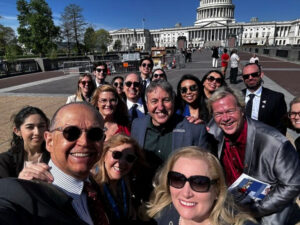
A group of New York state optometrists gather to advocate for the profession and patients on Capitol Hill. All photos courtesy of AOA.
Recap of an important day for professional advocacy for ODs.
More than 500 optometrists and students gathered for the American Optometric Association’s AOA on Capitol Hill event on April 15 and 16 to advocate for the profession, according to reporting in Women in Optometry.
AOA President Ronald Benner, OD, of Laurel, Mont., says that this is one of the largest groups ever assembled for the event.
Dr. Benner, who hands the leadership gavel to Stephen Reed, OD, at Optometry’s Meeting in June, says that he is proud that the organization has become more forward-looking and more direct in calling out those organizations that are trying to block the profession’s progress. “It not about pointing fingers but creating dialogue. That’s not always easy or comfortable, nor do we always get the results we want, but we’re not walking away from it,” he says.
Cuts to Medicare
“Over the past few years, Congress has been making cuts to Medicare, then restoring them a little, then cutting them again. It’s a common trend, and it makes it difficult for optometrists to plan,” Dr. Benner says. Today’s rates are comparable to those from 2012, he says, “and with inflation, it’s becoming more and more difficult.” Because many private payers set their rates based on the Medicare reimbursement structure, private plans are also not keeping pace with the expenses that eye care professionals face.
“The unintended consequence is that there are doctors leaving the Medicare system, so patients are being harmed,” he says. It puts pressure on those doctors who do provide these patients with care, and that’s notable for surgical referrals, particularly.
Federal bill HR 2474, Strengthening Medicare for Patients and Providers Act, will help bring needed stability to the Medicare payment system.
Vision Benefit Plan Abuses
A second topic that many of the doctors and students will be discussing with their legislative representatives is the vertical integration in vision benefit plans that creates an unlevel playing field for optometrists. “Our members feel highly pressured by vision benefit plans that cover 160 million people, or about two-thirds of Americans, and limit patient choices. This arm-twisting approach can also result in less access,” he says. But ironically, if optometrists stop accepting these vision plans, covered patients have fewer places to turn. “Even so, the vision benefit plans make money,” he says.
Dr. Benner and other speakers who address the group on Monday said the timing for this effort is excellent. Pharmacy benefit managers (PBMs) have been under scrutiny by the Federal Trade Commission, the U.S. House of Representatives Committee on Energy and Commerce for potential antitrust issues. Optometry is using the playbook developed by those who have been fighting the PBMs and using it to advance the issue that vertical integration in vision plans is unfair.
Federal bills HR 1385 and S 1424, Dental and Optometric Care (DOC) Access, would combat costly and controlling practices of federally regulated vision and dental benefit managers. The AOA and other supporters say this is necessary. Roughly one-third to one-half of plans side-step state-level laws because they are federally regulated.
Advocate for VA Inclusion
Like so much else in today’s political environment, the Veterans Administration (VA) system “has become politicized in the eye care world,” says Dr. Benner. “Medicine and ophthalmology have pushed back on allowing optometrists to provide eye care within the guidelines of the state’s scope laws in the VA. With its new electronic health records, the VA is working to define exactly what every profession is and what it can do. But with the differences in optometric scope across all the states, that’s not easy. We are asking the VA to follow the state rules. Optometrists should be able to provide the care in the VA for which they’re licensed,” he adds. “Instead of taking care of patients, we’re playing politics.”
Verification & Modernization
Another ongoing initiative is to support and seek co-sponsor for HR 2748, the Contact Lens Prescription Verification Modernization Act. This bill is supported by the Health Care Alliance for Patient Safety, in which the AOA, CooperVision, EssilorLuxottica and Johnson & Johnson are partners. When Congress passed the Fairness to Contact Lens Consumers Act, it charged the Federal Trade Commission with enforcing contact lens prescription verification requirements. However, enforcement has been lax, and the FTC has interpreted the law to allow robocalls as a way to verify prescriptions. This has led to an increase in illegal sales and/or filling the wrong or expired prescriptions, the AOA says.
A 2016 patient survey found that one-in-three patients were able to purchase contact lenses using an expired prescription. One-in-four patients reported receiving different medical devices that those prescribed by their eye doctor.
This act would help modernize the contact lens prescription verification process and make it simpler and safer for contact lens wearers.
Abundant Optimism
Because optometry is a legislated profession, there will always be the need to advocacy on the federal and state level. Yet Dr. Benner says the turnout and the progress that the profession has made buoys him. “Optometrists graduating today can provide care I never even considered when I graduated in 1986. And the numbers are in our favor. Optometrists are in 10,000 communities in the U.S., and we provide 85% of the eye care. We are the front line of care, and with the growing demand of medical eye care and the shrinking number of ophthalmologists, our role is vital,” he says.
He was delighted to see so many people attend the meeting. “These doctors are so enthusiastic about being here to work together to level the playing field and improve care for our patients. We have the training, the education and the experience.”
Advocacy-minded ODs should mark their calendars now for next year’s AOA on Capitol Hill, September 28-30, 2025.
Do you want to contact your U.S. Senator or Representative on one of more of these issues? CLICK HERE for background information.
Read other stories about women who advocate for the profession here.
Were you there? Share your experiences or photos from your day on Capitol Hill by e-mailing us HERE.



























